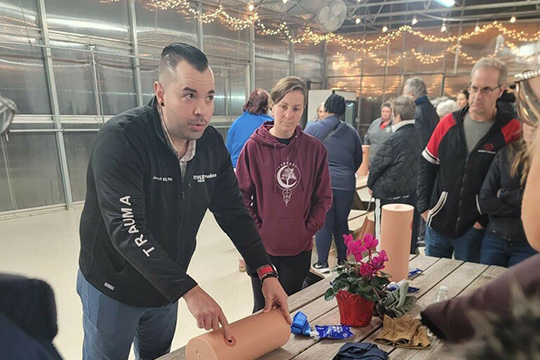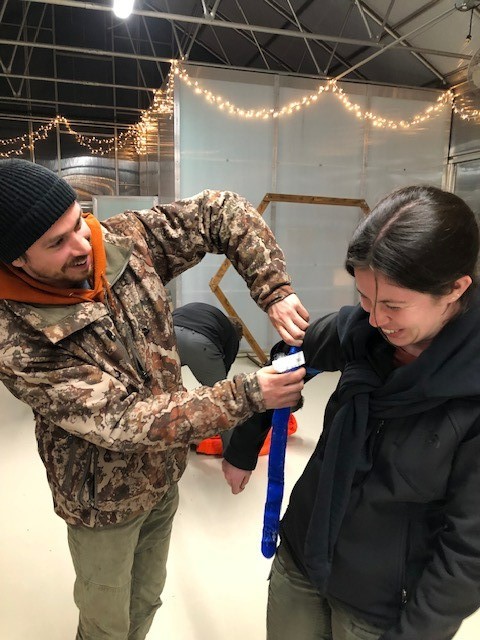Robert Wood Johnson University Hospital Level I Trauma Center Partners with Somerset County Board of Agriculture to Provide Stop the Bleed Training to Farming Community

Photo by Tony Kinette
(Franklin Township, Somerset County) - As a farm owner and member of the Somerset County Board of Agriculture, Cathy Blumig is keenly aware of the prevalence of traumatic injuries in the farming community. In fact, according to United States Department of Labor, agriculture experiences 23.5 deaths per 100,000 occupations, compared to 3.7 deaths per 100,000 for all occupations (U.S. Department of Labor 2022 statistics).
This knowledge combined with “close calls” and medical emergencies in her family’s past and witnessing other farmers sustain serious injuries, led Blumig to reach out to Robert Wood Johnson University Hospital’s (RWJUH) Level I Trauma Center to offer a Stop the Bleed education program for Somerset County farmers and beyond.
“In my life, there have been close calls, not just cuts, but medical emergencies,” Blumig explains. “For example, I was driving my mother to a doctor’s appointment one day when it appeared something was wrong. I wasn’t sure if she was having a heart attack or stroke. I had to reach back to information I picked up at the Sussex County Fair almost 17 years ago with BE FAST (on a refrigerator magnet), which educates you about how to recognize the signs of stroke and how to act. Knowing that information helped save my mother’s life. So, given the risks in agriculture, it made sense to learn what to do when someone is experiencing serious bleeding.”
Blumig, who runs Wolgast Tree Farm and Apiary (also in Franklin Township) with her husband, understands the risks farmers face every day. On their farm, they regularly use chainsaws – a dangerous, but very necessary tool of the trade.
“Agriculture is one of the most dangerous occupations in the United States,” Blumig notes. “Stop the Bleed is really valuable training for both farmers and non-farmers. It’s important to have an introduction about what to do in case of an accident or emergency, you may be able to help save someone’s life or your own. We invited the general public to participate because the training is important in itself, but also, I think it’s important for people to be aware of the risks that are attached to producing the food and other agricultural products that they use every day.”
Stop the Bleed encourages bystanders to become trained, equipped, and empowered to help in a bleeding emergency before professional help arrives. In some cases, the person next to a bleeding victim may be the one who’s most likely to save him or her from bleeding to death. By learning how to STOP THE BLEED®, individuals gain the ability to recognize life-threatening bleeding and act quickly and effectively to control bleeding. The training involves teaching three techniques in addition to first calling 9-1-1:
- Apply Pressure with Hands
- Pack Wound and Press
- Apply Tourniquet
“Life-threatening bleeding is a preventable cause of death after a traumatic injury,” explains Lisa Falcon, MSN, RN, TCRN, NE-BC, Director Trauma and Injury Prevention at RWJUH. “These types of injuries can happen at any time during normal everyday activities. Stop the Bleed training was designed so it could be taught to anyone that could encounter this situation. Participants do not need any previous medical training or knowledge. There are a few simple steps that could save someone’s life.”
RWJUH’s Level I Trauma Center held a training session at Suydam Farms in Franklin Township in March. Forty-two participants made up of mostly farmers, but also those involved with agriculture such as veterinarians, county extension agents and representatives of farm equipment companies, plus a few members from the general public, came from throughout the state to complete the training.
“Cathy contacted me about partnering with Stop the Bleed and explained why she was interested in organizing this training for our agricultural community,” says Falcon. “I immediately said yes! This was a great opportunity to impart this knowledge and skill set to members of the community where the potential for an injury with life threatening hemorrhage can be a reality.”
RWJUH has been offering the training since 2018, partnering with Rutgers Robert Wood Johnson Medical School, Rutgers School of Nursing, and community organizations such as senior living communities, utility agencies, high schools, and day care centers.
“We are also very fortunate that we have a very passionate group of individuals that spend many hours of their time in the community teaching Stop the Bleed,” Falcon said. “Without them, we would not be able to have the reach and dissemination that we do in our communities.”
Blumig and her fellow Board members were excited to work with RWJUH’s Trauma Team on the educational effort.
“They (RWJUH Trauma) treat some of the most serious, life-threatening injuries that we see in our area every day,” she said. “Their professionalism and experience gave us an excellent learning opportunity.”
Blumig hopes to work with her colleagues and partners like RWJUH to offer more trainings in the future.
“Knowledge is power,” she says. “Hopefully no one is ever going to need it, but you feel more confident and better prepared to know what to do when an injury happens.”
To organize Stop the Bleed Training with your organization, please e-mail lisa.falcon@rwjbh.org.

Photo by Cathy Blumig
About Robert Wood Johnson University Hospital
Robert Wood Johnson University Hospital (RWJUH) New Brunswick, an RWJBarnabas Health Facility, is a 628-bed academic medical center that is New Jersey’s largest academic medical center through its deep partnership with Rutgers Robert Wood Johnson Medical School. RWJUH is the flagship Cancer Hospital of Rutgers Cancer Institute of New Jersey and The Bristol-Myers Squibb Children’s Hospital at Robert Wood Johnson University Hospital, a nationally-ranked 2023-24 Best Children’s Hospital by U.S. News & World Report. Centers of Excellence include cardiovascular care from minimally invasive heart surgery to transplantation, cancer care, stroke care, neuroscience, orthopedics, bariatric surgery and women’s health. A Level 1 Trauma Center and the first designated Pediatric Trauma Center in the state, RWJUH’s New Brunswick campus serves as a national resource in its ground-breaking approaches to emergency preparedness.
RWJUH has earned significant national recognition for clinical quality and patient safety, including the prestigious Magnet® Recognition for Nursing Excellence and being named to Newsweek’s 2023 list of Best Ambulatory Surgery Centers. The RWJUH Advanced Comprehensive Stroke Center has been recognized by The Joint Commission and the American Heart Association as meeting The Joint Commission's standards for Disease-Specific Care Comprehensive Stroke Center Advanced Certification. RWJUH has also earned The Joint Commission’s Gold Seal of Approval® for Disease-Specific Care Certification for Spine Surgery; The Joint Commission Gold Seal Certification for Bariatric Services; and The Joint Commission Gold Seal Certification for Hip and Knee Replacement services. The Joint Commission also awarded RWJUH a Gold Seal Certification as well as an Advanced Certification in Ventricular Assist Device (VAD) Implantation.
Learn more about the Level I Trauma Center at Robert Wood Johnson University Hospital (RWJUH).
Contact: Peter Haigney
RWJUH Public Relations
(732) 937-8568